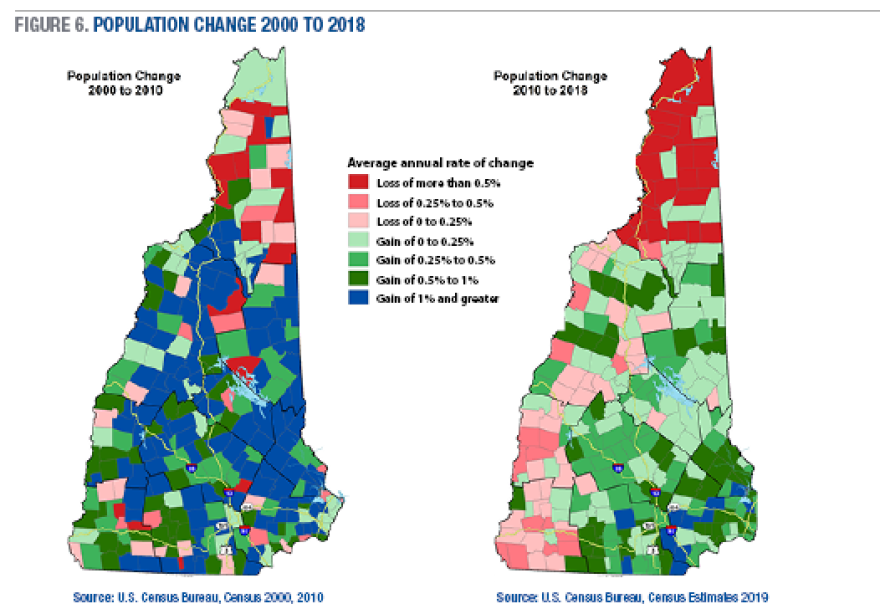Population growth in New Hampshire has been fairly modest in the last 20 years or so, but there’s been a substantial change in who is actually living in the state.
That’s according to a recent report from the UNH Carsey School of Public Policy. Senior demographer Ken Johnson is the author of that report. Morning Edition Host Rick Ganley spoke with Johnson about how shifting demographics in New Hampshire could affect the state's voting population in the upcoming presidential election.
This report finds that the state is becoming more racially diverse, especially among children. What is driving this change in population?
Well, it's a combination of two things. Partially, it's a function of migration. And also, it's a function of the fact that the white population is considerably older, and so fewer women are having children and more older whites are dying.
And your research shows that nearly a quarter of the people now in the state were not here just five years ago. What does that say about how the electorate in 2020 might be different from what it was, say, in 2016?
Yeah, it's a good question. We're still working on that second part of the question -- about how the electorate might be different. But it's very striking in a state like New Hampshire, which has relatively modest growth that would make it easy for people to assume, well, it's just the same people that are here. But in fact, there's a huge amount of turnover in the population. Just to give you an idea, in five years, 244,000 people moved into New Hampshire from other U.S. destinations and 214,000 left. So even though there was only a net change of 30,000, that's the basis of about 450,000 people changing place of residence.
So in a sense, when you think about the electorate that will be here in 2020 to vote, it's going to be significantly different than the electorate that was here earlier. And in addition to that migration, there also are a lot of older people who have died during that period and a number of younger people, teenagers, who are now old enough to vote. So it's just not the stream of migration that's going to change the electorate. It's also the fact that older voters are passing from the scene and younger voters are going to be able to vote in a presidential election for the first time.
In our past research, we found that the younger voters tend to be more liberal and that the migrants into the state are modestly more liberal or more Democratic than the population that's in the state. So if that trend were to continue, it could have implications for the primary and for the election. Again, we're still analyzing the voting data. So it's going to be another month or so for before we know the details of that.

But the report does reinforce something we have known for a long time. New Hampshire is still an aging state. But there's been that shift in new voters coming in, as you said. There's a younger population that's just voting for the first time. But we do know that, historically speaking, many younger demographics don't vote in the same numbers as older generations.
Well, that's absolutely right. And so that's another factor that needs to be brought into the calculus, is that the older voters tend to be more likely to vote. Whereas younger voters are more hit or miss. Now, presidential elections tend to be the time when they vote more. But again, the question of turnout is a whole different part of the story than this issue of who's there to vote.
But it is striking that we have that much turnover in the population. Certainly, there are people who I've talked to in the national media in particular, who, you know, look at New Hampshire as a state where everybody's lived here forever. When in fact, the state actually has one of the most mobile populations in the country. Only about a third of the adults in New Hampshire were actually born in the state. So that's a lot of turnover in who's here to vote in any given election.
Yeah, you think some 450,000 people changing households in five years and in a population of what, 1.3 million? That's huge.
Right.
And as you said, there's a lot more to this report that you're still analyzing. But aside from what you've learned about the electorate, what are your biggest takeaways in this report?
Well, I mean, you raise two of them, the growing diversity of the population. Now, of course, New Hampshire is still far less diverse than the population as a whole. In the United States, only about 10 percent of the New Hampshire population is minority, compared to about 40, close to 40 percent of the U.S. population. But the proportion has increased, nearly doubled over the last 10 years, and the place where we're seeing the change the most is among young people. Almost 15 percent of the young population in New Hampshire is minority.
And I mean, those trends are very consistent with what's going on elsewhere in the United States, where actually roughly half of all the births in the United States are now occurring to minorities. So, New Hampshire is nowhere near as far along as the rest of the country, but it certainly is more diverse than it was 10 years ago or 15 years ago.








